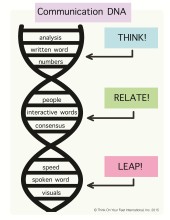Writing and Editing
The Best Thing I’ve Done to Improve my Writing

By Madison Abernethy
Throughout university, I was plagued by writer’s block. 95% of my designated writing time was, admittedly, mindless staring time – staring at a blank document, the ceiling, my cubicle neighbour, my cubicle neighbour’s snacks, what have you. In my mind existed ideas and opinions and prose, and in my mind is where they stayed.
Alas, writing is not always an easy, fun, or entirely productive process. Writer’s block can be crippling as it eats away at productivity and morale. It is a merciless disease. I am not being over-dramatic.
Fast forward: I am now working at McLuhan & Davies Communications, a Toronto-based global firm specializing in communications training and consulting. As part of the onboarding process, I was able to participate in several of our world-renowned workshops when I was first hired. One of these, Writing Dynamics™, focuses on writing clearly, concisely, persuasively, and fast.
The workshop’s pledge to faster writing allured me. In university, I could spend days writing a single page. I began writing papers weeks before they were due – fueled not by fervour, but by distress.
Needless to say, I was eager and willing to take the course.
The two days in Writing Dynamics™ were extremely valuable, and I took away many tangible steps to improve my writing. But one thing really stuck with me.
Within the first few minutes, we were asked how much of our total writing time was spe3 tnt planning what to write.
At the time, my idea of sufficient planning was to scribble down main themes and arguments, and to just get on writing. Who has time for the frills of brainstorming? Certainly not me! I’m a busy, important person and have things to write! I had been advised on the importance of brainstorming and planning in university, but had never fully digested the guidance.
I answered with 5% of my total writing time. Others’ answers varied, with 0% to about 20% representing the majority. My colleague, who was also new and in the workshop, raised her hand and responded: “about 50%.”
50%!? How nonsensical.
You can imagine my surprise when our facilitator smiled with delight at her response. “Nicely done!” she exclaimed. “That’s just about right.”
As I now know, my nonsensical colleague has a Bachelor’s degree in English and a post-graduate diploma in Journalism. One could say she is familiar with the writing process – the entire writing process. And yes, 50% is just about how much of your writing time should be dedicated to brainstorming and planning.
Writing Dynamics™ is a workshop developed by professional writers that teaches participants to better plan, draft, and edit their writing. As I have learned, the bulk of work should take place in the planning stages. It is in this part of the process where crucial points surface, main arguments are formed, and a piece of writing truly takes stature.
The writing bit is just where you place your ducks in a row. Planning is where the ducks are born.
Taking more time to edit has improved my writing substantially. I am more clear, more concise, and more persuasive – in less time.
So, what are my tips for someone who wishes to improve their writing by practicing proper planning? Below are my top four suggestions to keep in mind.
Structure your ideas
Writing Dynamics™ teaches a great system to organize your ideas visually: a thought-organization method that encourages drawing out main ideas and arguments – with the header as the centre and all sub-points sprawling from it.
The trick of this system is to just let your ideas flow. Remember that there are no bad ideas. If you think of something, that means it has value. Every initial thought is valid and can be honed down later through editing.
This method of brainstorming ensures your ideas are down on paper, and organized in a way that makes visual, flowing sense. This visualization has helped me stay on track, on target and on time. It has also cut down my planning time immensely.

Remember your ideal outcome
Are you requesting grant money? Submitting a complaint letter? A budget proposal? Creating a sales piece? Think about what you want your piece of writing to accomplish, and what you need to include and emphasize in your piece.
Your ideal outcome should also influence the language you use. Be conscious of making every single word work towards your goal.
How you structure your written piece is also vital. Pinpoint your most crucial points, and organize them to be most impactful.
Consider your audience
Who are you writing to? Your choice of language and the angle you take is dependent on this. You will write differently in a letter to your CEO than in a mass advertisement.
Put yourself in the shoes of your audience, and imagine their reaction to reading your message. What information would be most important and persuasive to them? Let this help dictate what you plan to write and how you write it.
Simple is better
Is what you’re trying to say getting across to your audience? We often see pieces that are too overly-technical, or rely on industry rhetoric to sound legitimate. Most times, the actual message trying to be conveyed is lost.
Think of what you want to say, and say it! Write down these thoughts in your brainstorming. The words you use here that are most simple and clear should be the words you use in your written piece.
Don’t try to use fancy words, unless you are writing a strictly technical document or an artistic piece. The point of writing is to convey a message, not to sound like you’ve swallowed a dictionary (although, in the off-chance you have you have, please seek medical help immediately).
Writing can be a strenuous practice. Taking the time to brainstorm and plan effectively has led me to a breakthrough in my own writing, and maybe it can with you as well. Take time to sit down and hash out your thoughts before picking up the pen, no matter how rushed or eager you may feel! You will have a much more productive writing session and ultimately a better writing piece because of it.
What are your best writing practices? Please share in the comments below!



